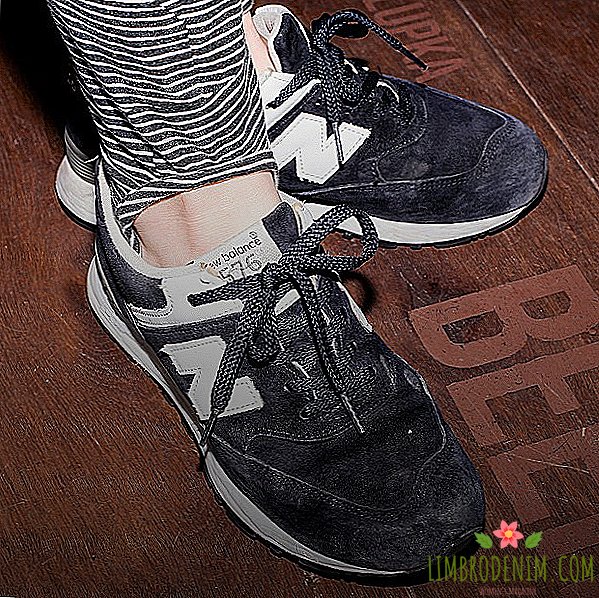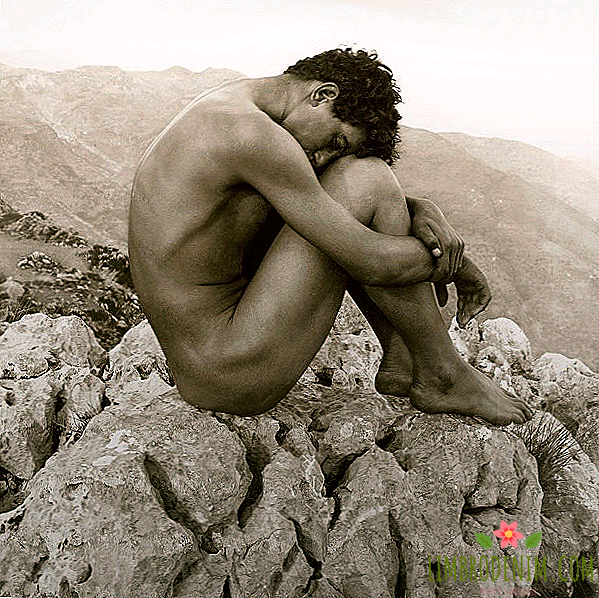How I moved to Chile and started a travel blog
I moved to Chile almost three years ago. My relatives, friends, work as an editor on a fashion channel and my usual everyday life remained in Moscow - a loved one was waiting for him in Chile. During the two years that we met, there were trips to St. Petersburg, where he then lived, to Madrid, where he soon moved, then naturally followed flights from Moscow to Santiago and crazy romantic dates, when we met in the middle of the globe - for example, Santorini. But at some point, the reality tactfully made it clear that without one address for two, this story has no future.

For me, the move was not an adventurous step with my eyes closed: before that I had been to Chile twice a month, I had time to study Santiago, and at the same time I traveled around the country. Despite this, I thought about it for quite a long time, weighed the pros and cons: my life in Moscow suited me perfectly, and besides, I had something to lose professionally. At some point I asked myself an honest question, what will I regret more in ten years: that my career expectations did not come true, or that a wonderful person that I love disappeared from my life? And everything immediately fell into place. In the end, when else to decide on insane acts, especially for love, if not 23 years old?
And here I am in the capital of a distant South American state, sandwiched between the Andes and the Pacific Ocean. I never looked at Chile through rose-colored glasses and from the very beginning I soberly assessed its advantages and disadvantages, because my move was due to love not to the country, but to a person. I remember well the impression of Santiago on the first day of arrival, then just a tourist one: glass skyscrapers, tidy houses with well-groomed territory around, shady avenues of Providencia district and many people similar to Europeans - that many Chileans in the family lurked Spanish, Italian, Croatian, German grandparents, I learned later. The picture was complemented by a huge lilac-blue wall of the Andes, which encircles the city - more spectacular scenery and not to invent. Only the Mapocho River in the center of Santiago, a liquid stream of coffee-colored, albeit of mountain origin, was terrified. Chile was the first Latin American country I visited, and I didn’t know what to prepare for - there were only vague associations with vineyards and gauchos. Like many compatriots, I thought with stereotypical images and had no idea what it was, distant and mysterious South America.
Chile is sometimes called the "Switzerland of South America", not without reason hinting that it is the most economically developed and stable country in the region with a low level of crime and corruption - especially in comparison with its neighbors. Chileans themselves ironically over this title: they love to criticize themselves, and even more - their government. The social situation here is calm - no terrorist attacks occur, and politicians are forced to take care of their image, otherwise they will not be re-elected. Many young people come to the country, including from Russia - they are attracted by the Start-Up Chile program, which funds promising start-ups. Calm diluted only protests on the streets. As a rule, students and employees of small shops in the city center are on strike when they demand wage increases: in such cases, work stops and all employees go outside with posters and loudspeakers. And on March 8, many women took part in a topless demonstration, showing their discontent with the ban on abortions in the country.
Chile is sometimes called "Switzerland of South America" - it is the most economically developed and stable country in the region.
I remember, I was pleasantly surprised by the neatly dressed policemen near the palace of La Moneda, who politely advised how and where to go. By the way, the very idea of giving a bribe to an official for Chileans looks like a completely wild and incomprehensible gesture and is fraught with big troubles. If you exceed the speed and try to pay off, then overnight stay behind bars is provided.
Language was one of the main problems for me at first. I knew Spanish well, but the Chilean version is difficult to understand by ear, it takes a long time to get used to it: the words are pronounced illegible, the endings and many of the consonants are “eaten”. Plus, the richest supply of specific idioms that are not used anywhere else - local speech consists of half of them. "Cachai weón po?" If you know Spanish, but did not understand anything from this phrase, this is normal. I often hear Latin Americans from other countries confess: "Before we arrived in Chile, we thought we spoke Spanish."
A couple of months after the move, I entered the marketing department of the University of Chile; such courses are called Diplomado and are considered a prestigious addition to the main diploma. The course consisted of several parts, each led by a new teacher with applied experience - among them were specialists from Google and owners of their own companies. Education here is based on discussions, while almost no one leads the usual lecture notes, not cram material. The emphasis is on working on practical tasks in a team - we even developed a startup model with the help of the Lego designer in one of the lessons.
I needed knowledge in the field of marketing in order to launch my project - an online jewelry store. It did not last long, because I frankly miscalculated with an understanding of the Chilean mentality, despite the active work with local bloggers and the press. It turned out that the market for online stores in Chile is still weak, and where it is more profitable to have a traditional corner in a shopping center. In addition, tastes really differ - it is not always worthwhile to offer minimalism in the style of Elizabeth and James in the hope of a fashionable revolution, when the country reigns in the everlasting fashion of gigantic hippie jewelery.
The first time after the move I worked as a regular freelance writer on the site, which was my place of work before Chile, and collaborated with other publications as a freelancer. To get a one-year visa after 180 days of tourist stay, you need a local work contract, so I got a job in a private company that works with innovative entrepreneurship projects and helps them apply for and receive grants from Corfo (a government organization that finances entrepreneurs), where I continue to work partially and Today. At the same time, I launched a Russian-language blog about travels in Chile, Chiletravelmag.ru, which from a simple hobby gradually grows into a serious project.
During the time of my life here, I traveled almost the whole country from north to south, and I had a lot of travel experience. There were multi-day trips to Torres del Paine and other national parks, trips to the Atacama Desert, to islands, to volcanoes, mountain lagoons, and all sorts of valleys. I have been to places that Chileans themselves often do not know about, although they really enjoy domestic tourism. By the way, I also became infected with this — between the trip to Tierra del Fuego and the distant Caribbean beach, I would choose the first one. Since there is little information on travel and life in Chile on the Russian-language Internet, I decided to share my experience on the blog pages; here I also talk about other countries in South America.
Over time, it became clear that Santiago is in fact a diverse city, and settling in Providencia, I naturally saw the life of only the so-called barrio alto, the prestigious districts in the east of the capital. This is an artificial "bubble", where it is comfortable and pleasant, but a completely different life boils beyond its limits: the majority lives in more modest conditions. The thing is that the quarter in which you live, largely determines your lifestyle and even status. It is important which school and institution you went to: it automatically determines the circle of contacts. In Santiago, it is considered perfectly normal when, when meeting at a party, perhaps the first question that unfamiliar people ask you is: "Where do you live?" At first I was precipitated, then I got used to it. In Moscow, not all friends know what district I am from, and in Santiago, especially conservative-minded employers can specify your address at an interview. Therefore, many are ready for a small apartment in poor condition, but located in Las Condes.
When my young man explained to me the peculiarities of the local social system, it was amused and annoying at the same time, it seemed like orders of the times of the colony. Over time, I myself was convinced that everything is so, just tourists do not read such things. In Chilean marketing there is even an official gradation of social classes of society by spell (A, B, C1, C2, and so on), which is often used in ordinary speech when, for example, people talk about the target audience of an institution.
After the move, I began to face an avalanche of questions, regardless of the part of the world, and felt the depth of the prejudices with which we live. Having learned that I am Russian, Chileans are very surprised that I speak Spanish fluently (and even learned in Russia! And even independently!) And that I freeze in winter in local houses without heating, where the average temperature is about 15 degrees Celsius. The set of questions is always standard, so you can deduce patterns. First of all, Chileans ask about your impressions of Chile. Loving the love story that brought me to their country, they are always interested in what distinguishes Chileans from Russians, in about this vein: “We are very open and friendly in comparison with Russians, are we?” You have to be especially upset by the fact that everything is relative, and among Chileans many go with poker face (if you have not met such people, you just stayed here a little). It is believed that Chileans are the coldest and most isolated Latinos (I felt well after the trip to Colombia), but then it is easier for Europeans to adapt.
The main question being asked with aspiration is about the Russian winter. We have to patiently tell about the wonders of Chileans unfamiliar with the wonders of central heating and that the same temperature in the mountains and on the plain feels differently. I also often explain that Russia is too big a country to generalize from Siberia to the capital, so now all my answers begin with an honest "I can only judge about Moscow." It's funny, but before the move, I didn't even think about it. In general, I am one of those expats who are trying to broadcast a good image of their homeland - I have no resentment towards my country, I did not leave in search of a better life and come home every year with a high kicks.
I am among those expats who are trying to broadcast a good image of the motherland - I have no resentment towards my country
I must say that I was very lucky: my young man is interested in Russian culture and knows about it firsthand, because he lived for half a year in St. Petersburg, and before that another year in Kiev. My mentality is close to him: he reads Russian classics, adores Russian cuisine, is familiar with the Hermitage collection, and he doesn’t need to explain why it is important for me to celebrate New Year and Victory Day, to go home in slippers instead of outdoor shoes, to give flowers and why Post Office of Russia "- not always the most reliable delivery method.
I noticed that Chileans are showing sincere interest and really want to know about my country. They frankly admit that they have no idea about Russia, and for the majority I became the first Russian person with whom they had ever communicated. But many acquaintances in Russia are still firmly convinced that in Chile there are coconuts on palm trees everywhere, the Caribbean coast, a round-the-clock samba on the streets and hot summer all year round are some kind of wild collective mix of Rio and Tulum beaches. They are very surprised when they see my photos in the off-season clothes. Coconuts in Chile, alas, also do not grow, and the Pacific Ocean is only teased - the water in it is ice almost everywhere. The theme of swimming in the country with the longest coastline in the world is my personal pain, like many untrained tourists. But the Chilean coast is great for surfing because of the strong waves. Three months a year in Santiago is cold. Without frost, of course, but there is a reason to get sweaters and down jackets: from June to August, I go in winter clothes. It's also funny when they think that Chile is something very tropical. In the diverse geography of Chile, which has become the hallmark of the country, there was a place for desert, lakes, volcanoes and glaciers, but the tropics are observed only on Easter Island, which is infinitely far from the mainland.
Speaking about Chile, people always ask about earthquakes: how can you live in a country where it shakes forever? Answering this question, I turn on all my Chilean training and give it up with a machine-gun burst: shocks up to seven points are not felt here at all. Yes, you read it right. And the stronger ones are felt as a light vibration, but nothing falls from the shelves, and the houses do not collapse according to the canons of disaster films. When I tell this, I see shock on the faces of people, which is understandable: in other countries, such earthquakes destroy entire cities, and the same strong earthquake in the world occurred in Chile.
For the first six months, I was often woken by the messages "Are you OK? You are shaking!" - It turned out that the news about the next push, which we did not even feel, leaked to the Russian news, when the Chilean press quietly ignored it. By the way, the locals love to brag about their indifference to earthquakes (“They sat in the bar and continued to sit”) and reassured all frightened foreigners with the fact that all buildings were built according to special standards, therefore the construction of the house moves into some kind of tricky movement , adjusting to the vibrations of the earth. The only real risk is in the tsunami. In general, a trip to Chile is a unique opportunity to visit a seismically active country without a real risk to life and the nervous system.
Life in Santiago (not to mention the rest of the country) is measured and quiet, it teaches to keep the rhythm and enjoy simple things without vigorous Moscow fuss. An ideal weekend in the view of the Chilean is a family dinner or a barbecue with rivers of wine, so on Sundays the city seems to be dying: with the exception of supermarkets and malls, everything is closed. Like many expats, I lack interesting events in the city, exhibitions and other cultural programs.
What I love most about life in Santiago (except for delicious avocados and wine) is the proximity to the mountains and hills. Previously, I would not have signed up for hiking trips, but recently decided that since I live here, I need to use my opportunities, and now on the weekends there are often stormy mountains - Santiago is surrounded by hills, so in less than an hour I can get from regular trails. I also like that in my barrio there is a very cozy and quiet atmosphere. There are many private houses with well-kept gardens in which roses, oranges and pomegranates grow, and I can walk to yoga studios, cafes and shops. For example, on the next street, a German made an extension to a private house and bakes there the most delicious bread, which we go out to buy almost in pajamas.
Sometimes you have to take yourself in hand in order not to finally adopt the great Latin American philosophy of "mañana" - this is when everything will be done tomorrow, and maybe never. Would I choose Chile if I hadn’t had a lot of love? Frankly, hardly. But the experience of living abroad is beautiful by the fact that it expands your perception of the world and teaches you to look at it without the prism of previous prejudices, both about other countries and about yourself.
Photo: Adwo - stock.adobe.com





